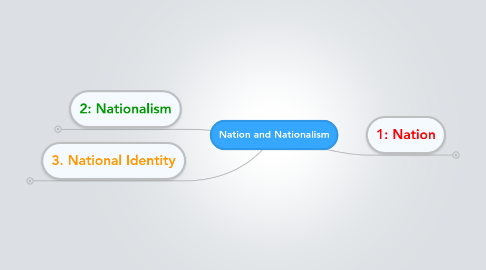
1. 2: Nationalism
1.1. Definition
1.1.1. Ernest Gellner
1.1.1.1. Political principle/congruenty
1.2. State Reinforcing
1.2.1. Linda Colley
1.2.1.1. Britons: Forging the Nation
1.2.2. Cool Britannia
1.2.2.1. Gordon Brown
1.2.3. WWII & Churchill
1.2.3.1. National Solidarity
1.3. State Subverting
1.3.1. Habsburg Rule
1.3.2. Miroslav Hroch
1.3.2.1. 3 Phases of Nat. Mobilisation
1.3.2.1.1. A: Scholarly Interest
1.3.2.1.2. B: Political Agitation
1.3.2.1.3. C: Mass Movement
1.3.3. Czechoslovakia (1919)
1.3.3.1. Nationalism through Homogenization
1.3.3.1.1. No Minorities
1.4. State Creating
1.4.1. Yugoslavia
1.4.1.1. Kingdom of Y (1919)
1.4.1.2. SFRY (1945)
1.4.1.2.1. SR: Bosnia & Herzegovina, Croatia, Macedonia, Montenegro, Slovenia, Serbia
1.4.1.3. Michael Mann
1.4.1.3.1. Dark side of Democracy
1.5. Banal Nationalism (Michael Billig)
1.5.1. Hot Nationalism
1.5.1.1. state subverting, creating, ect. extreme sitations, overt not covert, waving flag, wars,
1.5.2. Idelogicial Habits
1.5.3. Continual "Flagging"
1.5.3.1. "N. always near surface of cont. life"
1.5.3.2. "Mirror of narcissus"
1.5.4. Established Nations
1.5.5. Scottish Press Study
1.5.5.1. Alex Law
1.5.5.2. Benedict Anderson
1.5.5.3. Media & Nationhood
1.5.5.4. More explicit than England
1.5.6. Collective Amnesia
1.5.7. Banal N because "nationalism" has to go somewhere
1.5.8. N is simultaneously obvious and obscure
1.5.9. always ready to become hot again --> rel to hot
2. 3. National Identity
2.1. Manipulating NI
2.1.1. Nazi Germany
2.1.2. David Cameron
2.2. Anthony Cohen
2.2.1. Suspicious of collective nouns
2.2.2. Personal Nationalism
2.2.2.1. When I see the nation I am looking at myself
2.2.3. Personal/Self Identity
2.2.4. Cultural facts
2.2.4.1. Provide shared vacabulary
2.2.5. Interpreted not imagined
2.2.6. State as provider of means
2.2.6.1. Education
2.3. National Stereotypes
2.3.1. Israel
2.3.2. Sabra Cactus Plant
2.4. Measuring NI
2.4.1. Dual Identity in Scotland (McCrone (2001)
2.4.1.1. McCrone (2001)
2.5. Brubaker
2.5.1. Transilvania
2.5.1.1. 1: Disagreement and Conflict
2.5.1.2. 2: Avoidance of Sensitive Issues
2.5.1.3. 3: Joking and Teasing
2.5.1.4. 4: Choice
2.6. Charles Taylor
2.6.1. Importance of NI for Selfdefinition
3. 1: Nation
3.1. Imagined Comunities
3.1.1. Benedict Anderson
3.1.1.1. imagined
3.1.1.2. limited
3.1.1.3. sovereign
3.1.1.4. community
3.1.1.5. changing/not solid
3.1.1.6. print culture
3.1.1.6.1. Readers imagined community
3.1.1.7. Linda Colley
3.1.1.8. Leo Chavez "Shadowed Lifes"
3.1.1.8.1. Mexicans in US, both have imagined communities which hinders the assimilation of immigration in US soc. (from both ways)
3.2. Origins
3.2.1. Ernest Gellner
3.2.1.1. Agriculture
3.2.1.2. Industrial
3.2.1.3. Education
3.2.1.4. Mobility
3.2.2. Anthony Smith
3.2.2.1. Ethnie
3.2.2.2. History matters
3.3. Invented Traditions
3.3.1. Hobsbawm & Ranger
3.3.1.1. Westmister Palace
3.3.1.2. Kilts
3.3.1.3. Royal Wedding
3.3.1.4. Legitimacy
3.4. Schools of thought
3.4.1. 1: Nationalists
3.4.2. 2: Pernennialists
3.4.3. 3: Modernists
3.4.3.1. 5 Differences b/w school 1&3 (Hutchinson)
3.4.3.1.1. 1: will of the people, not god
3.4.3.1.2. 2: territorial differences
3.4.3.1.3. 3: assumption that nation & state will coincide
3.4.3.1.4. 4: print capitalism (anderson)
3.4.3.1.5. 5: mobility (lindholm/gellner)
